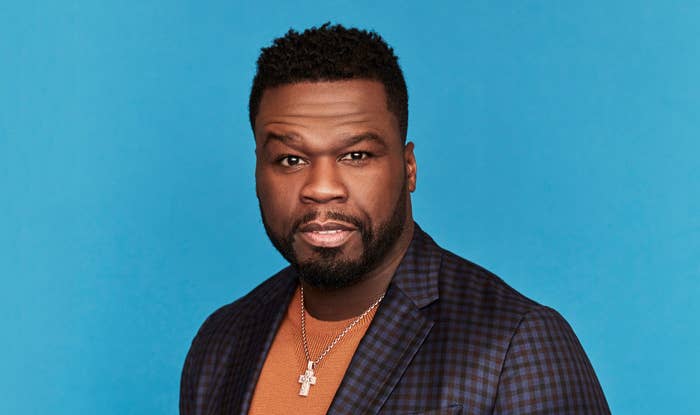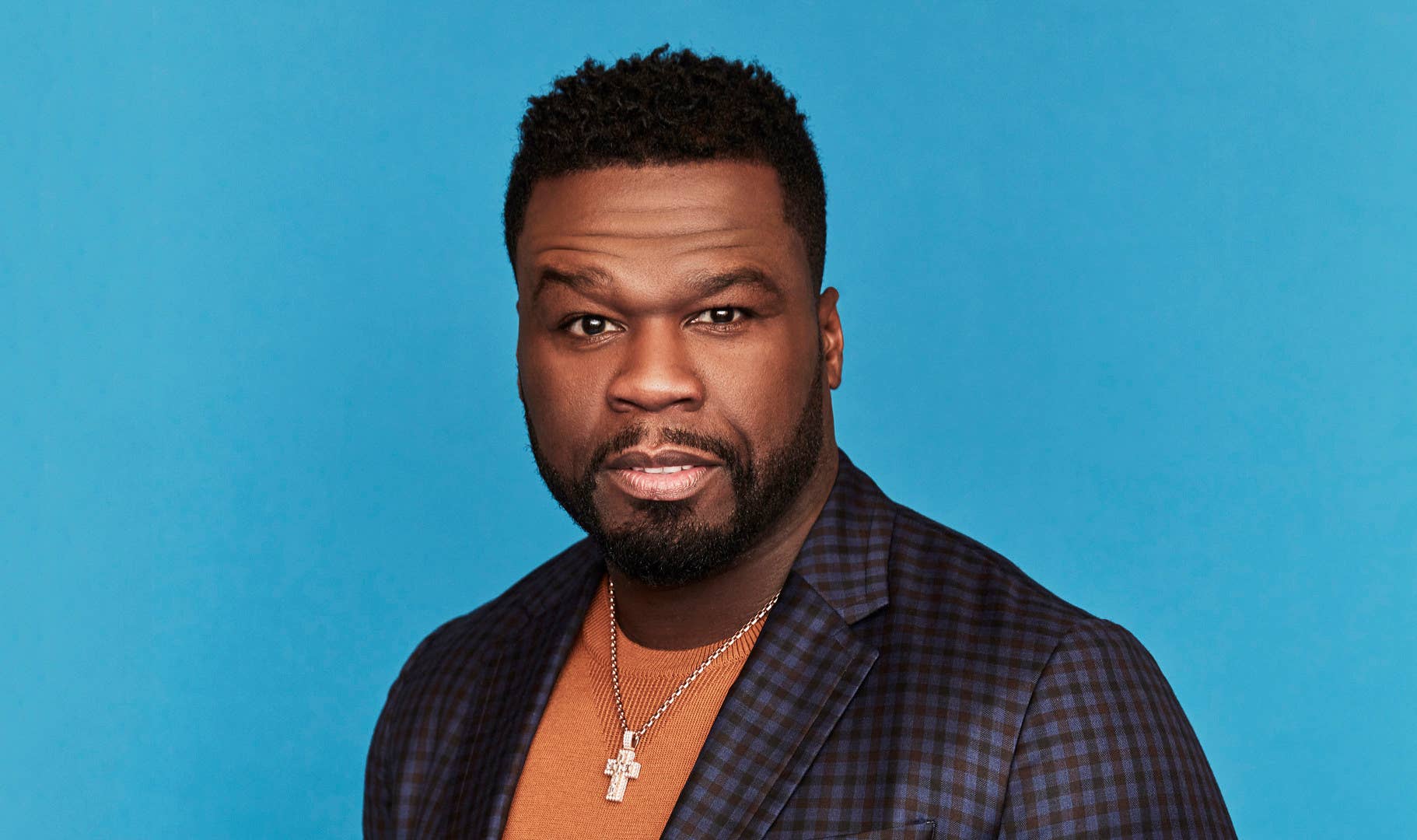
A couple weeks ago, 50 Cent declared he had no interest in participating in a Verzuz battle, telling Atlanta radio station V-103’s The Morning Culture show, “I think that’s for people that didn’t get enough while they were doing it. I got more than my share.” In theory, 50 is exactly the kind of artist who the celebratory platform seems to be for. His musical opus, Get Rich or Die Tryin’, just turned 18. His last studio album came out in 2014, and his last mixtape was released six years ago.
Unlike most artists with a similar distance from music, though, Curtis Jackson has no need for the spotlight of a Verzuz battle, because he can still garner headlines whenever he wants to. Any given week, the 45-year-old is in the news as often as most active artists. The conventional wisdom for hip-hop hustlers like him has been to use music to maintain cultural relevance and keep one’s name hot enough for branding; Jay-Z and Diddy have been very successful at that throughout the years. But aside from the occasional guest verse, and his work on Pop Smoke’s album, 50 has taken music out of the equation, staying relevant among rap circles without doing much rapping.
There’s a confluence of circumstances working for 50’s eternal relevance. For one, he’s a legendary artist who has done a good job of reaching out to the young artists who grew up idolizing his mythos. He’s still active in the entertainment world through television shows catered to Black audiences, acting as extensions of the stories he’s told in his music. Also, the man just flat-out knows how to use social media to his benefit. Whether he’s poking fun at a rival or giving his two cents on a trending story, he’s likely to have a response that captures the zeitgeist’s attention.
50 Cent can still garner headlines whenever he wants to. Any given week, the 45-year-old is in the news as often as most active artists.
As evidenced by controversial posts like his Megan Thee Stallion and Joe Biden takes, that’s not always a good thing, but some things just are. There are 18-year-olds who wish they were as good as 50 is at social media. There was the time he joked about buying 200 tickets to a Ja Rule show so the front could be empty. While some people critique award shows with tact, 50 called the Emmy committee “a bunch of Bengay my back hurt smelling ass old people” for snubbing his Power show. 50’s accounts are the domains for the kind of over-the-top jokes and ruthless character assaults that virality is made of. He’s realized that when it comes to staying in the headlines, it’s about saying what most celebrities won’t say.
His social presence, musical legacy, and Hollywood exploits converge to make him a one-of-a-kind presence in hip-hop. He doesn’t have a defined role in the rap world besides just being 50.
The Queens rapper has been unabashed about living his life by The 48 Laws Of Power, even co-authoring The 50th Law with writer Robert Greene. Two of the book’s rules are to “court attention at all costs” and “create compelling spectacles.” Just a cursory look through his timeline shows how much he took those tips to heart.
One of his first breakout moments was “How To Rob,” an oft-imitated song where he dissed a who’s who of artists, trying to “make everyone you think is somebody go, ‘who is 50 Cent?,’” as he has explained. Some artists took it in stride, while others, like Wu-Tang members, Big Pun, and Jay-Z, fired back. In 2007, he proposed a first-week sales battle with Kanye West, risking public embarrassment just for the hysteria of an album cycle. His Curtis album lost the battle to Kanye’s Graduation, but he garnered both men more attention than any marketing department could have attracted. And during the heat of his ongoing beef with Rick Ross, he took the conflict beyond diss tracks by creating an “Officer Ricky” cartoon, filming himself taking the mother of Ross’ children shopping, and posting the porn video of the other mother on one of his websites. Spectacle achieved.
50 has never had any chill: not at the beginning of his career, in his prime, or near the end of his commercial heights. He’s since taken that thirst for spectacle to social media, using his wit and recklessness to rail at everyone from the Empire TV show, Meek Mill, singer Teairra Mari, his former friend Floyd Mayweather, former labelmate Young Buck, and his archenemy Ja Rule on Instagram and Twitter. His social presence consists of mini-sagas that keep fans entertained and consistently tuned in to see what chaos he’ll create next.
Some believe he’s just being petty to be petty, but there’s a method to his madness. He usually hashtags one or more of his brands in his IG and Twitter posts, and he’s quick to center his social media tirades around promotions of his shows and movies, just like he did with his music as an artist. Being divisive isn’t the best way to keep friends in a network-oriented industry, but we’re also in an “all-publicity-is-good publicity” kind of a world.
The strategy has generally worked for him, but it’s not always harmless fun. Last year, he shared an insensitive meme about Megan Thee Stallion’s shooting, before apologizing and saying, “I wouldn’t have done that if I knew you was really hurt sorry.” But he didn’t apologize after pitting “exotic women” against “angry Black women” in a discussion with Lil Wayne, doubling down on IG that, “What I said is true now picture me, unaffected, unapologetic and unavailable for any other comments.” He also decided to joke about voting for Trump in the heat of the 2020 election season, an err of judgement he later walked back. When your sense of humor is based on abrasiveness and disrespect, sensitivity isn’t a deciding factor in the thought process. While we laugh when he attacks the “right” subjects, we cringe when he upholds harmful ideas.
The lack of tangible backlash for his inflammatory comments reflect not just the lack of consequences for demeaning Black women, but our collective desensitization toward his nature in general. He’s been so committed to lambasting people that he’s been able to brand his antics as “50 being 50,” sidestepping penalties that other public figures would have likely faced for similarly controversial comments. He works with a slew of TV networks and corporations, but none of them have ever come out and condemned his comments. Perhaps they just know what they signed up for.
The reasons his detractors “trash” him are the same reasons he became beloved by multiple generations of rap fans. Rapper IDK genuinely called him a “superhero,” echoing a sentiment of young people who grew up mesmerized by his against-all-odds comeback from being shot nine times. It’s not just that he got back into the music industry—he dominated it for a time with tracks that mixed bravado, menace, and melody, in a package we hadn’t quite seen before. Drake has said, “’21 Questions’ will probably be my most inspiring example of a guy who’s not supposed to be singing, singing.” Schoolboy Q called him “one of my biggest inspirations to rap.”
He harnessed the power of social media to keep fans locked into what he has going on, which helped him stay viable as an entertainer.
That status is what allows him proximity to young artists who are generally indifferent about veteran acts. It’s what allowed him to befriend Brooklyn phenom Pop Smoke, who reminded many people of 50, musically. When Pop tragically died last February, it was 50 who took it upon himself to help finish his Shoot For The Stars Aim For The Moon album, and he helped finalize a project that many people loved. The album (as well as his appearance on Griselda’s “City On The Map”) demonstrated that he could still make good music if he was focused on it.
But these days, he seems busier in Hollywood, working on movies and TV shows, like the upcoming Black Mafia Family show and the blockbuster Power series, which was so successful it was turned into a five-series universe by Starz. 50 was smart enough to not just attach his name to the show, but to play Kanan, a no-nonsense character right out of one of his rhymes. Pop culture is hip-hop culture these days, so it’s only right that artists get the chance to expand their rap stories into other mediums. 50 bonded his two passions when he released The Kanan Tape in 2015, which included his “I’m The Man” hit that ended up playing on the show. “Many Men” and “Get The Strap” also got played on Power. The show was one of Black America’s favorites, and the BMF series has a chance to be, too. He’s using his TV career to keep his name relevant in hip-hop culture in a way other rappers-turned-actors haven’t been able to replicate.
It’s true that 50’s musical catalog means that he could never not be relevant. 21 Savage and Pop Smoke remixed “Many Men” just last year, and Tom Brady continues to use the song as the social media soundtrack to his football triumphs. But 50 isn’t a rap relic. The allure isn’t just about what he’s done in the past. Even without making music consistently, he still feels present in a way that few veteran acts have been able to replicate. While Diddy was smart to attach his musical persona to brands and artists that augment a party-boy image, and Jay-Z stays on the pulse via artistic growth, 50 didn’t need music. He harnessed the power of social media to keep fans locked into what he has going on, which helped him stay viable as an entertainer. Artists looking to commodify their name once they stop rapping full time would be wise to follow in his footsteps (with a little more sensitivity). But try as they may, they probably won’t be able to do it exactly like he’s done it. There’s only one 50 Cent.

